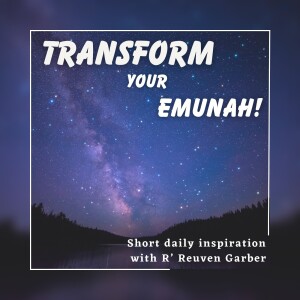
Thursday Apr 24, 2025
317 - Tests & Decisions (Part-4)
HaShem created the world in order that we have the opportunity to pass the tests that He presents us, and by doing so, earning our place in the next world. We've discussed that sometimes, when making decisions, it would be appropriate to look at Torah literature that is relevant to our circumstance, if that is applicable in this situation. And at the same time, many times, taking Daas Torah, seeking guidance from Torah sages, is one of the basic foundations of the Torah's perspective in making decisions. If we are to ask an individual who has not particularly thought about this question, how do you expect to find the right course of action in your life? Many would answer, HaShem has given me a brain, and I am expected to use that brain to make the right decisions.
Although ultimately, after everything is said and done, that might be what we are supposed to do, it is worthwhile to point out that throughout the stories of the Torah, we find many cases of individuals that were completely righteous and nevertheless committed some of the most grave form of sins. One example is the episode of Korach in the Torah, who as taught by many Torah sources, was known to have been one of the most righteous individuals of the generation, and as taught by the sages, following his thought process, thinking he was making the right decisions sincerely for the sake of HaShem. Nevertheless, we see that in the end, his decision was completely mistaken and wrong, and had very dramatically negative consequences. And in the same vein, we find throughout Tanach many characters who were on a level of righteousness that we could only imagine and dream about, but nevertheless, at the end of the story, they landed up in places that we wouldn't even fathom about doing such sinful and evil acts.
One example is a very great Torah sage and personality in the times of Shlomo HaMelech, Yeravam ben Nevat, who initially was a Torah sage of highest caliber, accompanied by his righteousness to levels that again we could only dream about, and at the end of the story, he managed to convince thousands and thousands of people to serve idols in the form of golden calves. Even though we have a well-known episode in the Torah itself outlining to us explicitly what a serious prohibition that is, but based on clever and logical reasoning that he explained why what he was doing was really the will of HaShem, he was led down this mistaken and sinful path. And again, we find many examples throughout the Torah and Tanach and throughout Jewish history of people who were sincerely trying to do the right thing, living lives of righteousness beyond anything we can imagine, and nevertheless were led astray based on following their own logic and thought process and ideas of their own which eventually brought them to places of tremendous sin and gravely severe consequences.
So that being the case, how can I be confident that I am not making a mistake in what seems logical to me and my thought process, knowing that I am certainly not as righteous as many of those characters that made mistakes throughout Torah literature? It would seem very worthwhile to humble ourselves, to realize that I am limited by my human nature and my human limitations, and we should also remind ourselves that it very well could be that the reason my mind and heart are guiding me to take a certain course of action and make this particular decision is because I have a vested interest in doing so, and not necessarily because this would ideally be the will of HaShem. Again, if it would be something obvious as to what would be the right course of action, for many of us, we would make the right decision, but much of the time it is not obvious as to what HaShem would want from us. So how are we to find HaShem's perspective, the only absolutely true perspective?
No comments yet. Be the first to say something!